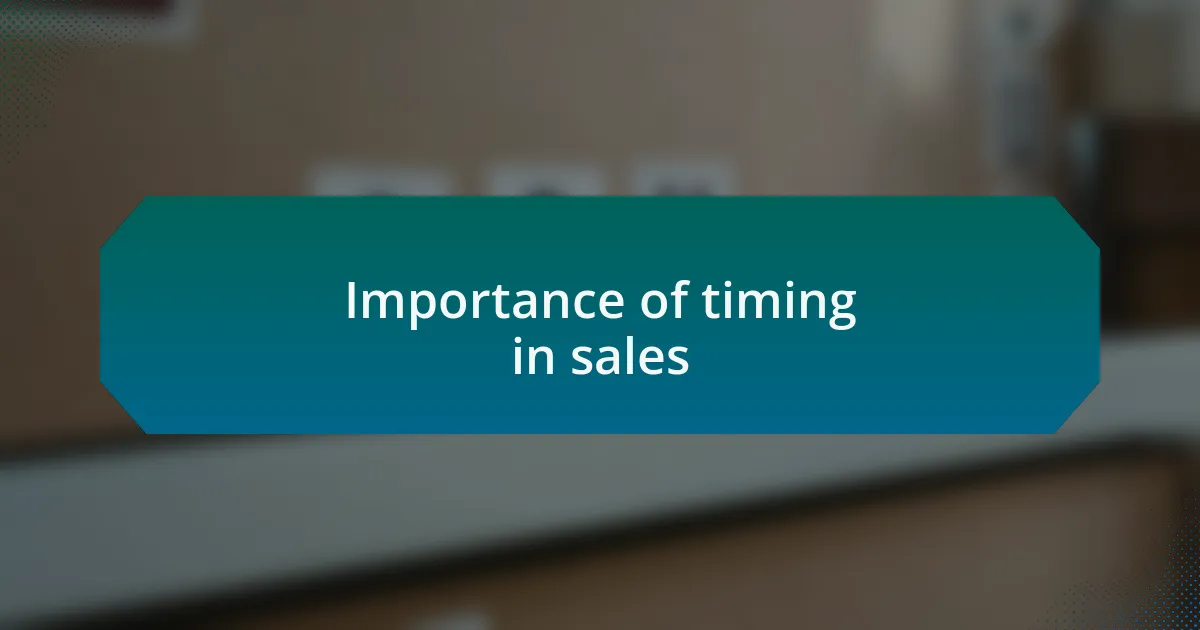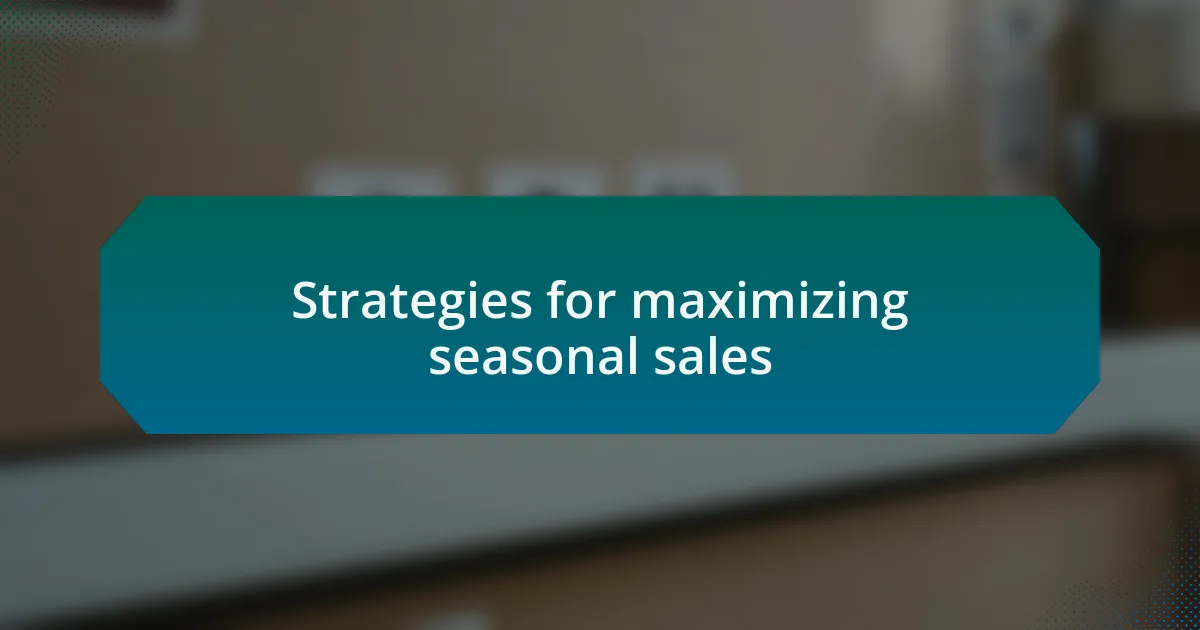Key takeaways:
- Luxury car sales are closely tied to consumer emotions and significant life milestones, creating a deeper connection between buyers and their vehicles.
- Seasonal factors like consumer psychology and economic conditions greatly influence purchasing behaviors, with spikes during holidays and favorable weather.
- Effective sales strategies include targeted promotions and enhancing customer experience through unique seasonal events, fostering emotional engagement and urgency.
- Understanding seasonal trends allows for better inventory alignment and adaptable marketing campaigns, ensuring relevance to customer needs throughout the year.

Overview of luxury car sales
Luxury car sales encompass a fascinating market that transcends mere transportation; it’s about prestige and lifestyle. In my experience, I’ve seen how the allure of brands like Ferrari, Bentley, and Rolls-Royce goes beyond performance—they represent a certain status. Have you ever felt that thrill when someone pulls up in a car like that? It’s not just a vehicle; it’s a statement.
Interestingly, many buyers often associate luxury cars with significant milestones in their lives, whether it’s a promotion, a wedding, or even retirement. I recall a friend who purchased his dream car right after bagging a big deal. The joy on his face was unmistakable, and it wasn’t just about the car; it was about celebrating his achievements. These emotional connections give the luxury car market its depth and appeal.
The seasonal aspect of luxury car sales also plays a crucial role. I’ve noticed that certain times of the year, like the end of the financial year or holiday seasons, see a spike in sales. Why do you think that is? Perhaps, it’s the festive spirit that prompts people to treat themselves, or maybe the desire to flaunt something special at family gatherings. Whatever the reason, these insights into the calendar’s influence on purchasing habits enrich my understanding of the luxury car landscape.

Factors affecting seasonal sales
One significant factor affecting seasonal sales is consumer psychology. I remember when I was considering a luxury car during the summer months; the sunshine seemed to amplify my desire for that sleek ride. It’s fascinating how seasons can sway our moods and spending habits. Why do people feel more inclined to invest in luxury items when the weather is pleasant? It’s likely tied to the idea of enjoying life experiences more fully, which often leads to higher sales during warmer months.
Another aspect to consider is the influx of new models released in the fall. I’ve often found that car enthusiasts eagerly await updates from top marques, and the buzz around new launches can create urgency in purchasing decisions. When I attended a launch event, I felt the excitement in the air as potential buyers were drawn to the newest features and designs. This anticipation drives sales, especially among buyers who want to be among the first to own the latest luxury offerings.
Economic factors can’t be overlooked either. During times of economic uncertainty, I’ve noticed that luxury car sales can dip as potential buyers hold off on significant purchases. Conversely, when the economy booms, there’s a palpable increase in confidence, and I’ve seen sales soar as people feel secure in spending on high-end automobiles. Isn’t it fascinating how broader economic trends ripple through individual buying behaviors in the luxury car market?

Importance of timing in sales
Timing in sales is everything, particularly in the luxury car market. I recall a moment when I impulsively decided to buy a luxury vehicle during the holiday season. The festive spirit, coupled with promotions from dealers, created an irresistible atmosphere that amplified my excitement. Isn’t it interesting how timing aligns with emotional highs, prompting decisive purchases?
The right timing can also significantly enhance customer engagement. I’ve seen how dealerships often host exclusive events during specific seasons to foster connections with potential buyers. Attending a spring showcase one year, I felt included in a community of car enthusiasts. This sense of belonging can elevate the buying experience and nudge hesitant buyers toward making that leap.
Sales strategies must align with the seasonal rhythms of consumer demand. For instance, launching a marketing campaign just before summer can perfectly coincide with buyers’ heightened desire for luxury adventures. Reflecting on my own experiences, I often found myself daydreaming about road trips as the weather warmed up. The thought of cruising down a scenic route in a new car can be a powerful motivator for those planning to upgrade their vehicle as the seasons change.

Strategies for maximizing seasonal sales
One effective strategy for maximizing seasonal sales is to leverage targeted promotions during peak buying times. I remember visiting a luxury car dealer during Black Friday, where they offered exclusive incentives that felt tailored just for me. Creating limited-time offers or bundled packages can stoke a sense of urgency in potential buyers, prompting them to act quickly. Isn’t it fascinating how the prospect of a deal can transform casual interest into a heartfelt purchase?
Another approach that I’ve found valuable is enhancing the customer experience with seasonal events. A spring garden party showcase at a dealership I once attended wasn’t just about cars; it was a celebration of lifestyle and luxury. Engaging with potential buyers through unique experiences, like test drives on scenic routes or invite-only events with luxury brand partnerships, can create lasting memories that resonate beyond the sale.
Finally, employing data analytics to understand seasonal buying patterns is crucial. I’ve seen brands that analyze customer behavior and tailor their messaging—like highlighting family-friendly features around school season or showcasing performance models before holiday getaways. Harnessing this insight helps align marketing efforts with what customers are thinking at different times of the year. How often have I found myself thinking about the practicality of a vehicle based on my upcoming plans? Timing these messages right can make all the difference.

Lessons learned from seasonal trends
Seasonal trends can reveal valuable lessons about consumer behavior that are often overlooked. For instance, I recall noticing an influx of buyers eager for convertibles during the summer months, a direct reflection of warmer weather and the desire for open-air driving. This spike reminded me that understanding the seasonal mindset allows us to align inventory with customer desires, making it easier to meet their needs.
One of the most striking lessons I’ve encountered is the impact of holidays on luxury vehicle purchases. During the end-of-year celebrations, I’ve seen clients rush into showrooms, eager to treat themselves or loved ones as a way to cap off the year. This taught me that tapping into the emotional resonance of these moments can transform routine sales into remarkable experiences, turning a simple transaction into a cherished memory. Have you ever thought about how much a special occasion can motivate a purchase?
Additionally, I learned that seasonal fluctuations often require adaptability in sales strategies. For instance, after noticing a dip in interest during certain months, I began adjusting marketing campaigns to highlight unique features that resonate with seasonal activities—like showcasing SUVs for winter adventures. This approach changed the game for me, ensuring I was in sync with my audience’s evolving needs. Isn’t it interesting how a slight shift in focus can elevate engagement?

Tips for leveraging seasonal sales
To effectively leverage seasonal sales, I recommend starting by incorporating marketing strategies that resonate with the current season. I remember once running a campaign centered around summer road trips, highlighting luxury SUVs and convertibles, which drove significant interest. Tailoring your messaging to evoke the thrill of adventure during summer or the comfort of family trips in winter can create a compelling narrative that attracts buyers’ attention.
Another crucial aspect is timing your promotions to align with key seasonal events. I once launched a special promotion around Black Friday, offering exclusive packages on high-end models. The excitement built around this shopping event allowed me to engage potential clients who were already in a buying mindset. Have you considered how specific dates resonate with your target audience and how you can harness that energy?
Lastly, I believe in creating a sense of urgency through limited-time offers during peak seasons. I experienced firsthand how a flash sale on a coveted model during Valentine’s Day sparked a rush among couples looking to surprise their loved ones. By strategically introducing urgency, you not only capture interest but also encourage prompt decision-making—a win-win for both parties. How do you think urgency can enhance your sales strategy?